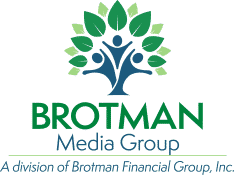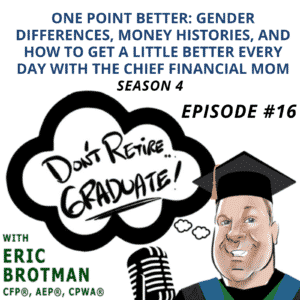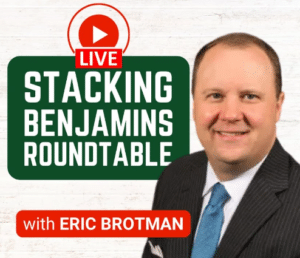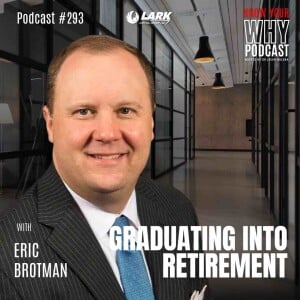Welcome back to Don’t Retire… Graduate! Today’s guest is the most educated individual we know in this industry. Dr. Mary Bell Carlson is a financial behavioral expert who has worked with the government, military, and financial educational organizations, is an adjunct professor of financial planning, and is the founder of Chief Financial Moms. She’s here to talk about gender differences in personal finance, money histories, and how we can get just one point better every day.
In this episode we’ll talk about:
•The asset shift from baby boomer men to women that will be taking place over the next decade
•How women and men look at financial advice and manage money differently
•The need for women in financial planning
•Personal financial literacy education and how to know if your school is teaching it
•Understanding your money history and starting conversations about it as a couple
•How you can get even half a point better each day
Resources mentioned in this episode:
Guest Bio
Mary Bell Carlson
Dr. Mary Bell Carlson is a financial behavior expert and has worked in both the military and government communities for the last decade. From the bowels of the Pentagon to international audiences, Dr. Carlson has presented numerous financial seminars and worked on a variety of financial planning and education projects. After getting married and having her two daughters, she started Chief Financial Mom.com, a personal finance education platform to help busy moms. Currently, she also works as adjunct faculty for the financial planning programs at both the University of Georgia and Texas Tech University.
Links:
- ChiefFinancialMom.com
- Facebook @ChiefFinancialMom
- Twitter @ChiefFinanceMom
- Instagram @ChiefFinancialMom
- YouTube Channel @Chief Financial Mom
- Linkedin @Mary Bell Carlson, Ph.D., CFP®, AFC®
[00:00:00] Eric Brotman: Welcome to Don’t Retire… Graduate!: The podcast that teaches you how to advance into retirement rather than retreating. I’m your host and valedictorian Eric Brotman and today we have a special guest and a longtime friend, Dr. Mary Bell Carlson, Dr. Carlson’s a financial behavior expert. She’s worked in both the military and government communities for the last decade. From the bowels of the Pentagon to international audiences, Dr. Carlson has presented numerous financial seminars and worked on a variety of financial planning and education projects. After getting married and having her two daughters, she started chief financial mom.com a personal finance education platform to help busy moms. Currently she also works as adjunct faculty for the financial planning programs at both the university of Georgia and Texas tech university.Mary welcome. Welcome to Don’t Retire… Graduate!.
[00:00:51] Mary Bell Carlson: Thank you so much. It’s great being here.
[00:00:53]Eric Brotman: So your, your, your credentials are beyond reproach. You’ve got more education than just about anybody in our field. In fact, you’re the first person I knew personally to go through the PhD program in financial planning. So let’s learn first, a little bit about you and your history andhow you, you married both financial planning and academia to build your career.
[00:01:17]Mary Bell Carlson: Absolutely. I’ll get I’ll take us way back. Clear back in high school, I was a bank teller for my local bank, and I remember being a senior and people asking me that, I dunno, hated question, I guess is probably the way to say it of what are you going to do in college? And I had no clue, but I knew that I liked people and I knew that I liked money, but I had no idea this thing called financial planning even existed. And so off I set off to my undergrad and to get a degree in finance and that long, long story made very short was it did not work out.
I ended up switching schools from BYU over to Texas Tech and finding this thing called financial planning. And they actually had a degree. They had an undergraduate, a master’s and a PhD program. And I took the intro class and absolutely fell in love with it and just thought, this is what I was made for.I went ahead and graduated from BYU with my undergrad in political science, and then went back and finished my master’s degree in financial planning, and then set off with a one-way ticket to Washington DC to find a job.
And it wasn’t necessarily that even wanted to go into financial planning. I’d really fallen in love with this thing called financial education and financial counseling specifically because I really enjoyed people and how people work, financial psychology as we kind of call it today. But that didn’t exist 20 years ago. And so I came out here, worked for FPA for some time as a lobbyist, and really got into that financial education world.
And then fast forward, I did some wealth management stents. Found out that I did not love wealth management and decided to go over to the Pentagon, got an opportunity to work with the military for about three years at the top level. And I flew all over the world, delivering financial education to service members and specifically service providers for the military. And during that time, I was kind of coming up upon my end of three years and I just had this inkling in the back of my mind. Like you need to go back and get a PhD, which let me just tell you now. I thought I was lucky just to get an undergraduate. So I had never any intentions in my life to get a PhD, but I had a wonderful professor named Dottie Durbin who told me when the student is ready, the teacher is willing. And that had stuck with me for a long time. And I felt like that was kinda my time. It was my calling to kind of go back and I naively thought it was going to be a master’s on steroids.
Well, it turned out nothing like that. I did little to no financial planning specifically. When we think of financial planning, investments, retirement, college planning, taxes. It’s kind of things. And I did everything around research and statistics, and so it was a whole different world, a lot more writing, a lot of research, really understanding how research works and how to apply research. And so after about three and a half years at Kansas state, I finished my PhD and then set back here.
I live right outside of Washington, DC, and have been here really ever since. And I’ve worked in and out of everything from academia to associations, I’ve done quite a few contracts with the government, both in the intelligence world and in the military world. And it’s just worked out really well for me and my lifestyle to really marry up this idea of financial planning, not just the practice of it, but really what we call practice management or I like to say the psychologists. Behind it, of what, how people think, how people react and how money plays a role in all of that.
[00:04:51]Eric Brotman: Mary, you talk about behavior and psychology. And I think behavioral finance is one of the most fascinating fields to come about in the last couple of decades. And you know, I’ve been doing this almost 30 years, which is disturbing in some way to me. I don’t feel that old, but nonetheless, I’m pretty experienced now. But you talk about in your, in your education, you, you talk a lot about not only military families and how financial decisions are impacted by their military service, but also ways that women treat money differently than men. And I’d love to dive into that. You know, mother’s day is coming. We’re going to get into chief financial mom, I promise. But can we talk a little bit about how women and men treat money differently? And maybe some of the things we need to look for? Not only as advisors, but specifically as consumers and as partners in life where those differences come to play?
[00:05:44]Mary Bell Carlson: Yeah, Eric, this is a great question, and it’s not only great for consumers, but also for financial planners that are listening to this.There was a recent study by McKinsey and company from 2020. And it talks about the massive asset shift that is going to take place over the next eight years. And they are anticipating that by the year of 2030 there will be $30 trillion that are going to be owned, most of that will be owned and controlled by women.That’s going to be a lot of the shift. The baby boomer men are going to, as they pass away, then the women are going to be holding most of those assets. And this is a big, big change we went to see today. Today about 10 trillion is in full control of women, but they’re expecting a large change over the next eight years.
Another really interesting statistic too, is that 70% of those women are going to change their advisors within one year of their partner passing. And I think this speaks a lot for a couple of things. One for advisors: advisors have to start paying attention to women. A lot of times, even in our office setup and the way we design our office space, it’s meant to have a direct conversation with really one person. And typically it’s a male advisor.
Most of our industry is men. And often they’re talking to the male on the other side of the table. Where women typically either aren’t in the room or if they are, they’re really not engaged with it. And I think this is going to be a big loss and a big change within the industry. And let’s go back to your question, Eric, when you said, how do women actually manage money differently than men? In this same study that McKenzie released, they make a few big points. One is women have a much greater focus on real life goals, whereas men are really more focused on the numbers. They’re focused more on net worth and how those numbers look. Women are really wanting those life goals. They want that satisfaction and connection back to family. It’s much more relational for women.
A second way in which women are different than men is women are wanting more help with the day-to-day cash management. Men are much more do-it-yourself type as a whole, but they were found in the study that many more times a women wanted that day-to-day help.
As this has been replicated in many different areas, women typically have a lower risk tolerance than men, but they also have a greater demand for advice, for financial advice specifically. And they’re actually two times more likely than men to pay for financial advice. So they want help and they want that connection, but they’re more interested in the relationship with the advisor than they are of how smart the advisor is or how much that advisor knows. So I think this is going to be a big shift that we’re going to see in the industry. And I think there’s going to be a big demand for women to be heard and to be seen and to be really recognized in our industry, by financial advisors.
[00:08:49]Eric Brotman: I’m incredibly enthusiastic about this change, because first of all, I think that financial plan, I I’ve often said financial planning is a verb, not a noun, it’s a process and not a thing, but also that the qualitative pieces are often so much more important and so much more impactful than the quantitative pieces of planning, that I think women naturally make better financial advisers than men do.
And I, there are obviously exceptions to that and, and there’s nuance, but you know, in our office we’ve maintained roughly a 50/50 split between male and female advisors, not so much on purpose as we just find great people and they do great work and they happen to be diverse. But you know, the, the clients who are you know, women, women, anecdotally and I think through various studies, though I can’t quote them. I think women are more loyal as clients, too, than men so long as they’re being respected and heard and listened to, and feel like they’re getting a good experience. Have you seen that?
[00:09:51]Mary Bell Carlson: Yeah for women, it really is about the relationship. And that’s where behavioral finance, as you mentioned earlier, comes into place. It’s about the connection. I heard this the other day. It’s more about relational than it is transactional. And that is so true for women in the financial space. They, they want to understand it, but they also want to make sure that it’s meeting their family goals. They’re, they’re connected to other people and their relationships with them, as well as their advisor.
It’s important to have those relationships all across the way. And this is whether it’s end of life planning or if it’s just the beginning and you have a young professional in your office, it doesn’t matter. It’s all about relationships.
[00:10:34]Eric Brotman: Let’s shift to financial education because for most of the country financial education we receive is nil. It’s not that it’s not very good. It’s that it’s not present. It’s not taught in most schools and where it is, it’s sporadic. And it certainly is not getting a whole lot of quality control.
You can graduate from college, have $200,000 in student loans and a credit card balance for that ski trip you wanted to take freshman year. You can’t balance a checkbook, but you’ve got a college degree and I don’t understand why we continue to ignore what is one of the most important life skills involved in adulting. Why aren’t we teaching this? And what’s the best way to change it.
[00:11:16]Mary Bell Carlson: That’s a good question. And this has been a question that’s been in place for several decades now at the top level. So one of my first jobs, as I mentioned, I worked for the financial planning association straight out of my master’s degree, and I really love this field of financial education. Well, the treasury had recently at that time started around table of all of the most senior leadership in all of the different, various federal agencies that had financial education programs, which honestly is just about every, every agency had something and they would get around the table at least once a quarter, they still do those meetings.
And we would be in the treasury cash room discussing how this can be implemented. One of the individuals that I’ve met over the years through that, and many other situations is a woman named Laura Levine who runs jumpstart and jumpstart is a nonprofit organization that works on specifically advancing financial literacy and education in K through 12. And they have incredible resources. Their website is jumpstart.org, and they have a tremendous amount of resources for not just educators or advocates, but also for parents.
And I think one of my favorites it’s something called check your school.org. And it’s a place where parents can actually go and see if your school is teaching financial literacy in the curriculum. And if not, it’s a way they have a direct connection to reach out to the educators or the principal of that school and encourage that. And I think that’s a really important aspect is to be able to get in the schools and to teach.
I happened to homeschool my children as well, and we even do it within our curriculum. So I am starting to see it more and more in curriculums where you’re starting to see it statewide in some states. It depends on where you live, if it’s included or not. But I am hopeful that this is a changing tide and that it isn’t going to be what you and I saw 30 or 40 years ago.
[00:13:19]Eric Brotman: I hope that’s true because it’s getting more complicated and the financial world is not a, it’s not a place necessarily for the timid.
And mistakes can be exponential ones. So it’s really important to get, to get started on the right foot. And you know, what we’ve tried to do as an organization at BFG is create financial literacy resources and push some things out that are free, that, that, that consumers can get to.
You mentioned jumpstart. I’m also a big fan of junior achievement. You know, these organizations that do some career type skills and some financial literacy type skills. They exist. There just isn’t a cohesive piece. And I have yet to meet a single human being who thinks financial literacy shouldn’t be taught in schools. I don’t know one person who says what a terrible idea. Everyone says. That is a great idea. Who’s going to do it and how? And what will it replace?
[00:14:08]Mary Bell Carlson: It even starts at home, right? I mean, this is a bit of a chicken and egg problem because we talk about will, it should be taught in schools. But at the end of the day, a lot of teachers don’t know about it themselves, where they feel timid or reluctant themselves because they aren’t managing their own personal finances well. Same thing is true of parents.
You just asked a great question. Who’s going to teach it? If a parent feels shame or embarrassment around their personal finances, they don’t necessarily want to pass that on to their children. And so most of us just don’t talk about it and ignore it and pretend that it’s going to go away. And yet all that does is continue to sow the seed of generational financial illiteracy that is passed on again and again. And if you want to change the past, you start right now in the present and you start by talking about money and it doesn’t have to be a taboo topic. It needs to just start with a conversation.
One of my favorite things to work with clients on is money history. So it’s a very easy way to start a conversation of how did you grow up with money? What was it like to you? Even when I got married, actually my husband and I learned quickly, I asked him a lot of these questions and we quickly learned that we came from two very different worlds and how he related to a dollar was very different than how I did.
And he remembers times of not having enough food on the table. He remembers sleeping in his car. He remembers being without well more than I ever did. And so it’s very interesting how those early, early childhood memories play into his wellbeing, financial wellbeing, specifically 40 years later. And it still impacts how he handles money to this day. And so that’s a great place to start. If you want to start talking about money is start talking about your money history.
[00:16:05]Eric Brotman: There’s a lot of baggage that comes with money and you use the word shame. I think people are mostly embarrassed of their money, whether they have a whole lot of it and think that’s embarrassing or whether they don’t have as much as they think they should, because their neighbors look like they have more money. I mean, there’s, there’s so much baggage around it.
And we do learn these lessons from our parents. And it’s rare that they’re taught to us. It’s more that we observed them because money is one of the things couples fight about most. I mean, it causes more, I think money and kids are the things that couples fight about. And so if you grow up watching your parents fight about who spent what at the grocery store, you’re going to carry that with you. And then you’re going to enter a marriage and your partner grew up seeing those kinds of things with money. And it’s just you’re right. It’s a snowball effect. And the only way to nip that in the bud is to create a safe space, to have this discussion where it’s not taboo and to learn some of the basics.
I don’t, I don’t understand how young people are expected to make giant financial decisions before they’re old enough to go to their local bar. I don’t get it. I mean, they’re making student loan decisions that are catastrophically expensive, and, you know, they’re barely old enough to drive or vote and they’re making these huge financial decisions that are going to be with them for 30 years. And it just seems like a terrible idea.
These banks, these banks, Mary, will lend to young people who have no collateral to get an education, but they won’t lend to those so same young people who want to start a business. Entrepreneurs can’t get capital from a bank. I don’t get it.
[00:17:42]Mary Bell Carlson: Yep. Well, and I think it was discussed in your most recent podcast where he talked about what it would be like if you don’t go to an Ivy league education and how those numbers actually stack up pretty relatively and now I’m not advocating here for us not going to school or not getting an education. I do think an education is vitally important, but I think is even more important is how you handle money.
And when I say you I’m looking directly at you, listener that is to be said is how do you think about it? How do you talk about it to start their own discovery process through this? You know, Eric, you mentioned that the fights about money are some of the most prevalent fights that in children there’s actually research to back that up. Britain do research out of BYU and Kansas state from years ago, came out to say that money fights are the biggest indicator for divorce than any other topic.
And so with that, it is really important that you’re not passing that on generationally down, because just as you said, if that’s how they, the, your children see it’s normalized is it’s okay to fight about it. Then they’re going to continue that cycle. And I’ve seen this, Eric not just on the fighting side, I’ve seen it on the bankruptcy side. I know that when I had some clients several years back, they came in the, I worked with government workers that had to have a security clearance and they would come through. And if there were financial issues or something along those lines, and they were in risk of losing their security clearance, they were sent to me.
And so there was a couple a while back that said, Hey, we’ve got some problems. I kind of started to uncover it and they were pretty close to bankruptcy again. And as I started to talk to them more about it, come to find out it wasn’t just the first or second time they’ve declared bankruptcy, but actually both sets of parents on both sides had declared bankruptcy multiple times so much. So that one set of parents actually moved to Mexico. To live more cheaply and to be able to get away from their debt.
And so I told them at that time, I said, if you don’t want to pass this onto your children, you have to do something about this. Now, otherwise that generational bankruptcy issue is going to be passed down and continued for multiple generations until someone decides to stop and relearn and move forward where it needs to happen.
[00:20:18]Eric Brotman: Sage advice, Sage advice. I want to talk about your website. I want to talk about chief financial mom.com because I think it’s a very cool idea. And I think it suits you to a T and I think you have the t-shirt and if you don’t, I think that you should be selling them. That could be definitely some of the merge on your site. So tell, tell everybody who’s listening about chief financial mom.com and, and w who it’s designed to help and.
[00:20:45]Mary Bell Carlson: You bet, just like it says in the name it’s for moms and I’ll even back up and tell you a little story about how it came to be. I was pregnant with my first daughter and outright after I delivered, I remember being up really early in the morning or late at night, when you’ve got a newborn, as many of you know, that those hours just kind of melt together and you’re awake during all of them. And I remember scrolling on my phone, through my emails and all I had was these advertisements specifically as a mom, as a new mom, right.
They know how to get your email. They know how to get your number essentially, and really market towards you. And I remember listening to this and being. Where’s the good stuff. Where’s the education. Just like you mentioned a minute ago, Eric is where do we learn about money? Because all I’m seeing is buy, buy, buy. And I looked, and I couldn’t find anything that really suited that niche.
And so that’s where I started chief financial mom is I thought, well, here I have a PhD and I teach at a university and yet I can do more. I can give back. And so it’s my way of giving back to my community, to other moms that are interested in learning more of not just doing it yourself, but even learning enough to go and hire a financial advisor.
In fact, one thing on the website, and I’ll send you a link for it. Eric, for your listeners is I’ve got. Questions, a little booklet to ask. What questions do you ask a financial advisor when you go to hire one and how do you know which is a good and bad financial advisor? And I think those are the things that are empowering to moms is being able to know what questions to ask and in what way, what is good?What is bad?
So less on the technical side, but more, much more on the relational side and just being okay with where you’re at. There’s no shame. There’s no guilt. There’s no, I should have known it is what it is. And it, you are what you are today and it’s okay. And so bringing all of that with you and saying, let’s make a change and make myself a little better for tomorrow is what chief financial mom does for me.
Eric Brotman: Well, I, first of all, please do send that link. We’ll put it in our show notes. And I hope our listeners will check out chief financial mom.com. Tell us about real money, real experts, because you’re hosting a podcast too. And so for folks who are enthusiastic about hearing more from you, that’s a great place for them to check you out.
Mary Bell Carlson: Absolutely. Yeah. Real money. Real experts started a couple of years ago. And it’s with the association for financial counseling and planning education or AFC PE. And it’s specifically for those financial coaches, counselors, educators, or someone interested in getting.
We just finished this week, our career segment, we’ve been going through the last six months of what careers are in this space and how to get into them. We’ve also done a number of interviews around financial empathy, relational money, how to start your own business or what it’s like. We just interviewed Laura Levine that I just mentioned earlier on jumpstart to talk about financial education and where it goes.
So we’d love for you to check it out and love any questions that you would have for us in return.
[00:24:10]Eric Brotman: Well, we are getting dangerously close to the end of our show, and I want to make sure as the educator you are, that you give us a doozy of an extra credit assignment. Our, our listeners, the students of this program don’t want homework. So don’t give them a homework assignment. We need an extra credit assignment that can help them ACE this course. So what would you suggest would be the first step or the first takeaway? From our time together today.
[00:24:36]Mary Bell Carlson: Absolutely. Thanks for asking that. I, in my classes that I teach, there is something that I always teach about. And one thing is scaling questions. If you’ve ever taken a class from me, you know what a scaling question is.It’s on a scale from one to 10, one being a horrible experience, 10 being a great experience, how did this work for you today?
Now, what I, what this can be used to, it can be used with your children. It can be used as a financial advisor, communicating with client. It can be used in almost any situation, but my favorite part is not actually the number that the person gives you.







